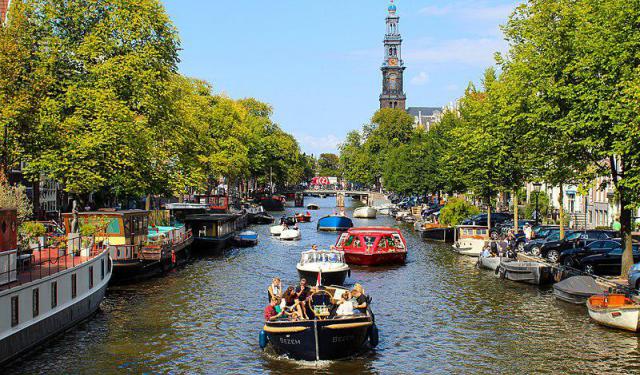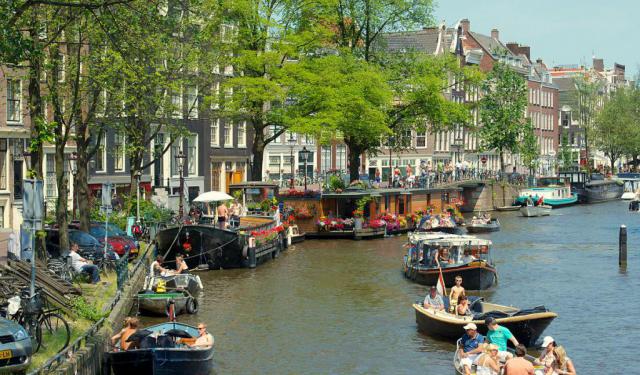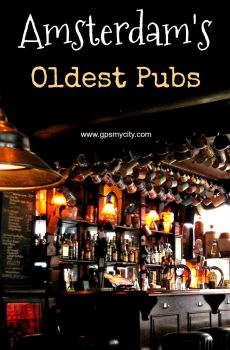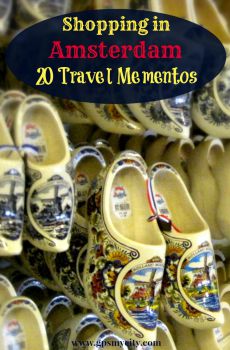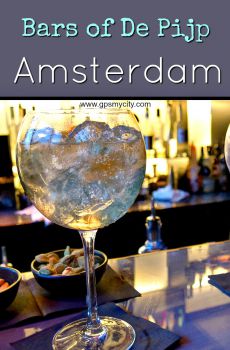Esnoga (Portuguese Synagogue), Amsterdam
Amsterdam’s reputation for tolerance and religious freedom made it a beacon for Jews fleeing persecution. By the late 15th century, Jews escaping Spain and Portugal’s Inquisition found refuge in the Netherlands. At the time, the Dutch Republic was at odds with Spain, so these newcomers adopted the label “Portuguese Jews” to keep things simple and avoid further conflict.
The community flourished, and by 1665, their crowning achievement took shape: the grand Portuguese Synagogue-also known as the Esnoga. Its design borrowed from the Neoclassical style popular in the Netherlands, with elegant pilasters and a concealed balustrade. At the time, it was the largest synagogue in the world, inspired by the grandeur of Solomon’s Temple in Jerusalem.
To this day, the Esnoga remains a portal to the past. Standing along one of Amsterdam’s busiest streets, its 17th-century design and interiors remarkably untouched. Electric lights? You won’t find them here. Instead, you’ll be welcomed by the flicker of roughly 1,000 candles, their soft glow illuminating antique furnishings and intricate décor.
Tourists are invited to explore Europe’s second-oldest synagogue still in continuous use, and as a bonus, each admission includes access to the Jewish Historical Museum, conveniently located just steps away across the street.
Insider Tip:
Don’t just admire the main hall-explore the annexes. The board room, winter synagogue, candle room, and mourning room each tell their own story. Be sure to head down to the treasure chambers, where you’ll find precious 16th-century manuscripts, gold-threaded tapestries, and books from the oldest Jewish library in the world.
The community flourished, and by 1665, their crowning achievement took shape: the grand Portuguese Synagogue-also known as the Esnoga. Its design borrowed from the Neoclassical style popular in the Netherlands, with elegant pilasters and a concealed balustrade. At the time, it was the largest synagogue in the world, inspired by the grandeur of Solomon’s Temple in Jerusalem.
To this day, the Esnoga remains a portal to the past. Standing along one of Amsterdam’s busiest streets, its 17th-century design and interiors remarkably untouched. Electric lights? You won’t find them here. Instead, you’ll be welcomed by the flicker of roughly 1,000 candles, their soft glow illuminating antique furnishings and intricate décor.
Tourists are invited to explore Europe’s second-oldest synagogue still in continuous use, and as a bonus, each admission includes access to the Jewish Historical Museum, conveniently located just steps away across the street.
Insider Tip:
Don’t just admire the main hall-explore the annexes. The board room, winter synagogue, candle room, and mourning room each tell their own story. Be sure to head down to the treasure chambers, where you’ll find precious 16th-century manuscripts, gold-threaded tapestries, and books from the oldest Jewish library in the world.
Want to visit this sight? Check out these Self-Guided Walking Tours in Amsterdam. Alternatively, you can download the mobile app "GPSmyCity: Walks in 1K+ Cities" from Apple App Store or Google Play Store. The app turns your mobile device to a personal tour guide and it works offline, so no data plan is needed when traveling abroad.
Esnoga (Portuguese Synagogue) on Map
Sight Name: Esnoga (Portuguese Synagogue)
Sight Location: Amsterdam, Netherlands (See walking tours in Amsterdam)
Sight Type: Religious
Guide(s) Containing This Sight:
Sight Location: Amsterdam, Netherlands (See walking tours in Amsterdam)
Sight Type: Religious
Guide(s) Containing This Sight:
Walking Tours in Amsterdam, Netherlands
Create Your Own Walk in Amsterdam
Creating your own self-guided walk in Amsterdam is easy and fun. Choose the city attractions that you want to see and a walk route map will be created just for you. You can even set your hotel as the start point of the walk.
Western Canal Belt Walking Tour
The Western Canal Belt is Amsterdam at its most iconic-picture-perfect and brimming with history. Part of the city’s famed Canal Ring, a UNESCO World Heritage Site, it’s a neighborhood that marries beauty and function.
Back in the 17th century, the three major canals-the Gentlemen’s Canal, the Emperor’s Canal, and the Prince’s Canal-were masterfully designed to loop around the... view more
Tour Duration: 2 Hour(s)
Travel Distance: 2.6 Km or 1.6 Miles
Back in the 17th century, the three major canals-the Gentlemen’s Canal, the Emperor’s Canal, and the Prince’s Canal-were masterfully designed to loop around the... view more
Tour Duration: 2 Hour(s)
Travel Distance: 2.6 Km or 1.6 Miles
Amsterdam Food Tour
Amsterdam's food scene is a delightful fusion of local traditions and global influences. Making your way through the interlocking canals, pretty bridges, and a maze of streets laden with diverse eateries and bars may easily render you hankering for a bite to eat and/or a drink to wash it down with.
The diverse culinary landscape of Amsterdam caters to a wide range of tastes and... view more
Tour Duration: 2 Hour(s)
Travel Distance: 2.6 Km or 1.6 Miles
The diverse culinary landscape of Amsterdam caters to a wide range of tastes and... view more
Tour Duration: 2 Hour(s)
Travel Distance: 2.6 Km or 1.6 Miles
Red Light District Walking Tour
For centuries, Amsterdam’s Red Light District has been a source of endless intrigue. Its heart and the most historic section, De Wallen, is a fascinating blend of medieval charm and modern-day notoriety. Here, you’ll find timeworn canal houses leaning at curious angles, narrow cobblestone alleys lined with old bars, cozy shops, and a sprinkling of late-night establishments. And of course, the... view more
Tour Duration: 1 Hour(s)
Travel Distance: 1.8 Km or 1.1 Miles
Tour Duration: 1 Hour(s)
Travel Distance: 1.8 Km or 1.1 Miles
Plantage Walking Tour
Amsterdam's Plantage neighborhood has been throughout the centuries a place of rest and entertainment. Beside its impressive 19th-century architecture, there is the historic Royal Zoo, and close-by is the verdantly exotic Hortus Botanicus. Follow this self-guided walk to explore one of the greenest neighborhoods in Amsterdam – a lovely place to stroll and laze.
Tour Duration: 1 Hour(s)
Travel Distance: 1.7 Km or 1.1 Miles
Tour Duration: 1 Hour(s)
Travel Distance: 1.7 Km or 1.1 Miles
Amsterdam Introduction Walking Tour
The Dutch capital, Amsterdam, some say, “dances to its own beat.” Indeed, Amsterdam – where “hipness meets history” – has a rather unusual life rhythm and style, famously manifested in the air of legalized cannabis, coffee shops, and the Red Light District. In large part, this “air of freedom” attracts annually to the city over five million visitors.
As a small fishing village,... view more
Tour Duration: 2 Hour(s)
Travel Distance: 4.0 Km or 2.5 Miles
As a small fishing village,... view more
Tour Duration: 2 Hour(s)
Travel Distance: 4.0 Km or 2.5 Miles
Jordaan Walking Tour
The Jordaan district of Amsterdam is a popular neighborhood renowned for its charming, narrow streets, quaint courtyards, and picturesque canals. Replete with beautiful historic houses, many of which have been converted into cozy cafés, trendy boutiques, and art galleries, this district has a distinctive atmosphere that sets it apart from other areas in the city.
The Jordaan was originally... view more
Tour Duration: 1 Hour(s)
Travel Distance: 2.4 Km or 1.5 Miles
The Jordaan was originally... view more
Tour Duration: 1 Hour(s)
Travel Distance: 2.4 Km or 1.5 Miles
Useful Travel Guides for Planning Your Trip
12 Traditional Dutch Foods You Must Try in Amsterdam
Cool climate, closeness to sea, and sense of adventure have made the Dutch what they are – skillful farmers, industrious seafarers and, generally, people with the taste for life and good hearty meal, whether it comes from the sea they live by or the land they set their feet on. All of this has...
The Oldest and Historic Pubs of Amsterdam
Amsterdam is a stunningly beautiful city, steeped in history, with hidden treasures and fascinating tales practically around every corner. Like all marvelous cities, Amsterdam has its share of dining and drinking establishments from the modern to the ancient. This guide will assist you in exploring...
Dutch Sweets and Pastries
Known primarily for their cheeses, the Dutch have proven just as passionate about their sweets and pastries, many of which have come about as a result of the centuries of colonial past that had infused Holland with Oriental flavors and ingredients. Blended with their own dairy-rich European...
Souvenir Shopping in Amsterdam: 20 Dutch Things To Buy
Tulips, red lights, weed... Other than these, there are plenty of good things to remember Amsterdam by. What's more, you can take home some of them quite legally. Look here to see what to buy in Amsterdam and...
Top 7 Dutch Cheeses to Try in Amsterdam
Don't mind things turning a bit "cheesy" when in Holland. After all, this small country is renowned for its cheese manufacturing and successfully competes, in terms of cheese exports, with such economic giants as the United States and Germany. Amsterdam alone and its vicinities are...
Bars of De Pijp, Amsterdam
Sitting to the south of the Centrum (city centre) De Pijp area of Amsterdam is a fascinating mixture of trendy urbanites, students, immigrants and Amsterdammers. De Pijp has a long history as the Bohemian part of town, which is reflected in the different cafés of the area. There truly is something...




